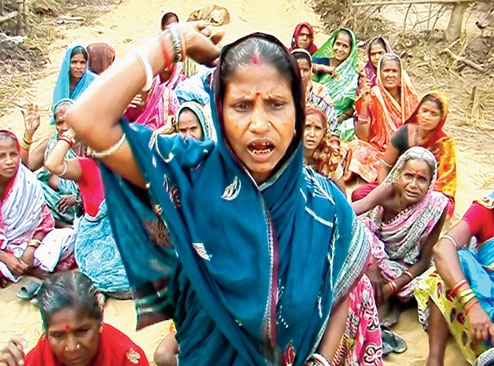‘This is a case not only of human rights risks and harms, but also, much more broadly, of contests over development agendas, and who gets to set them.’
A new case study, ‘POSCO’s Odisha Project: OECD National Contact complaints and a decade of resistance’ from the Non-Judicial Redress Mechanisms Project explores important questions about the role of non-judicial mechanisms in the advancement of human rights where business is involved.
POSCO in Odisha
In 2005, Korean steel company POSCO signed a Memorandum of Understanding with the Odisha state government in India to build a US$12billion integrated steel project, involving a plant, mine and associated infrastructure.
Since then the project has faced strong opposition from the communities affected by the proposed steel plant, who do not want to relinquish their agricultural lands and face displacement.
The conflict between the company and the communities has escalated over time, and has involved multiple incidents of violence and intimidation by police and other actors against anti-POSCO protestors, and filing of hundreds of criminal cases against protesters, the legality of which has been called into question by human rights experts.
This is a case not only of human rights risks and harms, but also, much more broadly, of contests over development agendas, and who gets to set them.
The NCP complaints
A coalition of Indian, European and Korean non-governmental organisations, working in solidarity with the Anti-POSCO Peoples’ Movement, submitted a complaint to the OECD National Contact Points for Korea, as well as the Netherlands and Norway, whose national pension funds are invested in POSCO. The Korean National Contact Point refused to take the case, arguing that it was an Indian issue, and the Norwegian pension fund refused to cooperate.
The Dutch National Contact Point facilitated some discussions between the pension fund, POSCO and the complainants. It found that the Dutch pension fund’s efforts, in the form of visits and phone calls, to pressure POSCO to improve its human rights record in India, were sufficient exercise of the pension fund’s human rights responsibilities.
Nevertheless, the Dutch NCP offered to facilitate a fact-finding mission to resolve issues over which the company and the complainants disagreed –namely the existence of human rights violations.
When the parties were unable to agree on terms for a fact-finding mission, largely because POSCO wanted considerable control over that mission, the Dutch NCP offered to facilitate dialogue, but complainants refused. The case was closed.
The complainants refused dialogue because they stood to gain very little from such a process. Their primary objective is to stop the POSCO project and retain their land rights and agricultural way of life. Though a negotiation may result in more cash compensation, it cannot achieve these goals.
Words without action
The OECD Guidelines for Multinational Enterprise emphasise the importance of community consultation, but these commitments are designed to facilitate the smooth passage of industrial projects, not stop them.
Ultimately, then, despite some reasonable efforts from the Dutch and Norwegian NCPs, the NCP process made no identifiable positive contributions to protecting, respecting or remedying the human rights concerns directly raised in the complaint.
Where these mechanisms rely on the good will of corporations, and require only policy-level changes in corporate activity, without concomitant changes at the coalface, they arguably achieve very little.
Perhaps even worse, they may act as a shield for corporations to continue problematic behaviour. In this case, the NCP process has led POSCO, which was previously inexperienced in this area, to develop some voluntary human rights commitments, but has not led to any tangible changes in its business behaviour in India. This may have equipped POSCO with tools to deflect criticism without making changes on the ground, thereby having an ultimately damaging effect on human rights fulfilment.
***
This guest blog was written by Dr Sam Balaton-Chrimes, lecturer in the School of Humanities and Social Sciences at Deakin University.
The Non-Judicial Grievance Mechanisms project will generate a series of case study reports (of which this is one), reports on particular grievance mechanisms, and thematic analytical reports. These reports are intended to inform policy and practice in providing redress for victims of corporate human rights harms. This is an advance report on the POSCO case study. A final report will be released late in 2015 as part of a suite of case studies.


